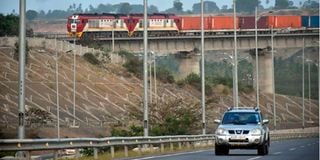Premium
Truckers sue Munya over SGR tea transport order

A cargo train leaves for Nairobi via Mombasa's Southern Bypass on February 12, 2021. Truckers who have sued the state say they will suffer immense losses if KTDA follows through with a directive to use the SGR to transport tea leaves to Mombasa.
Four truck owners have sued to stop the Kenya Tea Development Agency (KTDA) from using the Standard Gauge Railway (SGR) to transport tea leaves from Nairobi to the Mombasa auction.
Through lawyer Harrison Kinyanjui, the truckers and two other people have cited loss of jobs that would result from the order issued by Agriculture CS Peter Munya in September.
They also argue that an arrangement exists between tea farmers and their respective transporters engaged through KTDA.
In the petition filed under a certificate of urgency, the transporters said their trucks are specifically made for carrying tea and implementing the directive will render their trucks obsolete.
“To configure such hundreds of trucks in the arising scenario is not only overly costly but will occasion financial hardships on the petitioners and other interested parties in similar capacity,” Mr Kinyanjui said.
He also argued that the petitioners had borrowed money from financial institutions to buy the trucks for the purpose of transporting tea and would suffer immense losses.
CS Munya ordered 54 factories affiliated with KTDA to use SGR’s cargo train to transport their produce to Mombasa as part of cost-cutting measures.
The directive is effective November 1.
Mr Kinyanjui also said that CS Munya’s decision involved thousands of farmers who were not consulted through public participation.
Mr Kinyanjui also said that the implementation of the directive will be far-reaching as each truck has directly employed three people and indirectly four others.
“Granted the spread of the families and extended families these individuals support, the loss occasioned will be monumental,” he said.





